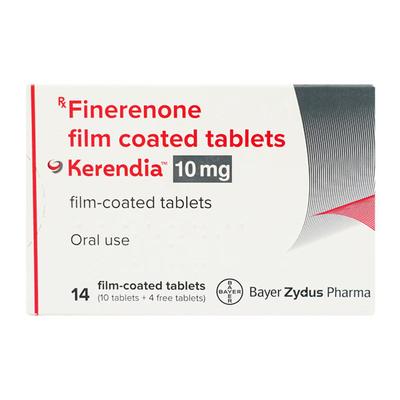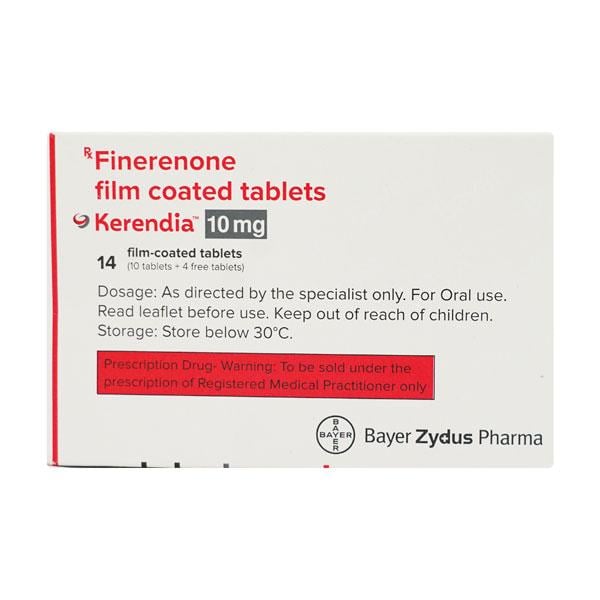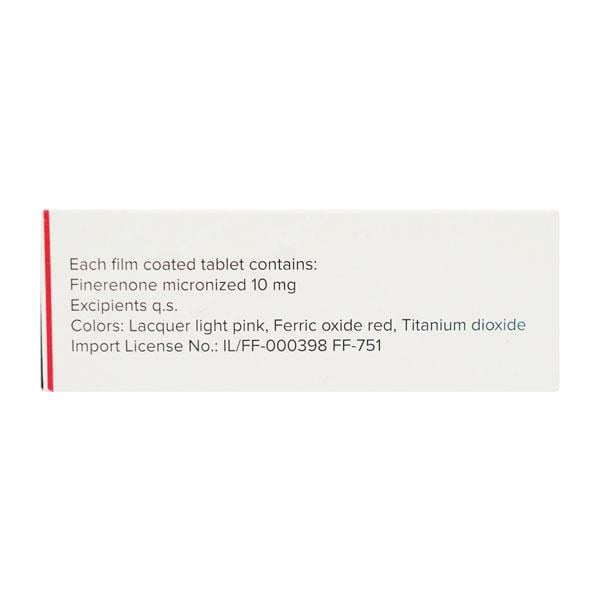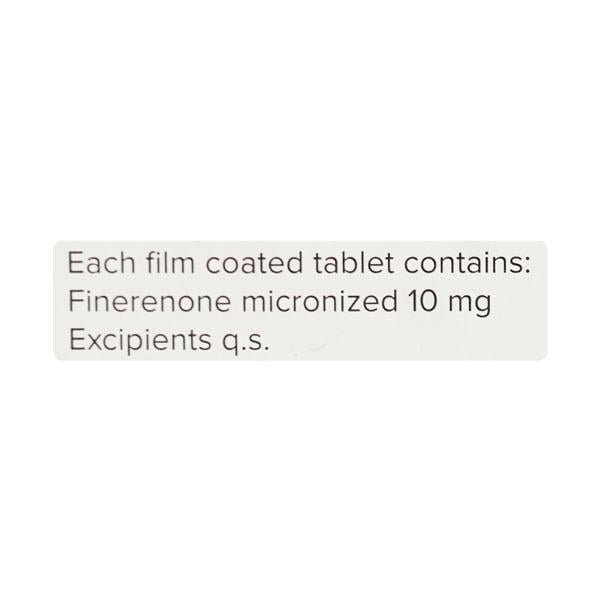

Netmeds First Membership
Quick Links
Introduction About KERENDIA 10 TABLET
Kerendia 10mg Tablet is a prescription medicine primarily used for adults with chronic kidney disease (CKD) associated with type 2 diabetes mellitus. It is formulated to protect the kidneys and heart by blocking the harmful effects of the hormone aldosterone, which can cause inflammation and scarring in kidney tissues. This medicine is particularly suitable for patients who are at risk of worsening kidney function or cardiovascular complications due to diabetic kidney disease.
It belongs to a class of drugs called non-steroidal mineralocorticoid receptor antagonists. By inhibiting aldosterone activity, it helps reduce kidney inflammation, slow CKD progression, and provide cardiovascular protection. It is ideal for adult patients with type 2 diabetes and CKD who require additional kidney and heart protection despite standard therapy, such as ACE inhibitors or ARBs. Your doctor will evaluate kidney function, potassium levels, and overall health before prescribing this medicine.
Kerendia 10mg Tablet is usually taken once daily, with or without food. Swallow the tablet whole with water and try to take it at the same time each day to maintain consistent medicine levels in your body. Regular follow-ups and blood tests are important to monitor kidney function and potassium levels. Patients should avoid sudden discontinuation, as consistent therapy is essential for optimal kidney and heart protection.
Kerendia may increase potassium levels or lower blood pressure in some patients. Common side effects include dizziness, fatigue, or mild hyperkalaemia, while rare but serious reactions include severe high potassium or allergic responses. It is not recommended during pregnancy or breastfeeding, and alcohol intake should be limited. Patients should also avoid potassium-based salt substitutes unless advised by their doctor. Regular monitoring, adherence to dosage, and consultation with healthcare providers are crucial to ensure safe and effective use.
Uses Of KERENDIA 10 TABLET
- Management of chronic kidney disease (stage 3 and 4 with abnormal presence of albumin in the urine) associated with type 2 diabetes in adults
Benefits of KERENDIA 10 TABLET
Kerendia 10mg Tablet for Chronic Kidney Disease (caused by Type 2 Diabetes Mellitus)
Kerendia 10mg Tablet is prescribed for adults with chronic kidney disease (CKD) associated with type 2 diabetes mellitus. High blood sugar over time can strain and damage kidney function, leading to reduced filtration capacity. This medicine contain Finerenone, works by blocking harmful effects of mineralocorticoid receptors that contribute to kidney stress and fluid imbalance. It supports kidney health, helps slow down disease progression, and lowers the risk of complications related to type 2 diabetes and CKD. Regular monitoring of potassium levels and kidney function is advised while taking Kerendia 10mg Tablet.
How KERENDIA 10 TABLET Works
Kerendia 10mg Tablet Mechanism of Action
Kerendia 10mg Tablet works through its active ingredient, Finerenone, a non-steroidal mineralocorticoid receptor antagonist (MRA). In type 2 diabetes with chronic kidney disease, overactivation of mineralocorticoid receptors leads to inflammation and scarring in the kidneys and heart. By blocking these receptors, Kerendia reduces fluid buildup, oxidative stress, and tissue damage. This helps support kidney filtration capacity and reduces further strain on cardiovascular health. Its selective action makes it effective in protecting kidney and heart function while lowering long-term risks.
How to use KERENDIA 10 TABLET
How to Take Kerendia 10mg Tablet
- Take Kerendia 10mg Tablet exactly as advised by your doctor.
- Swallow the tablet whole with a glass of water; do not crush or chew it.
- It can be taken with or without food but try to take it at the same time each day.
- Do not change the dose or stop taking the medicine on your own.
- If you miss a dose, take it as soon as you remember. Skip the missed dose if it is almost time for your next one do not double the dose.
Kerendia 10mg Tablet Dosage Instructions
- The dosage of Kerendia 10mg Tablet depends on your kidney function, potassium levels, and overall health condition.
- Usually, the starting dose is 10mg once daily, which may be adjusted by your doctor after monitoring test results.
- Your doctor may increase the dose to 20mg once daily if your body responds well and potassium levels are stable.
- Regular monitoring of blood potassium and kidney function is essential while on this medicine.
- Always follow your doctor’s prescribed schedule for safe and effective use.
What if I forgot to take KERENDIA 10 TABLET
- Take it as soon as you remember on the same day, if it is not too close to your next scheduled dose.
- Skip the missed dose if it is almost time for your next one. Do not take two doses at the same time to make up for the missed dose.
- Do not double up – Taking more than the prescribed amount can increase the risk of side effects like high potassium or low blood pressure.
- Resume your regular schedule after the missed dose. Maintaining consistent daily intake is important for kidney and heart protection.
- Keep a reminder system – Use a pillbox, alarm, or app to avoid missing doses in the future.
Overdose
If you or anyone else accidentally takes more Kerendia 10mg Tablet than prescribed, consult your doctor immediately or visit the nearest hospital. Symptoms of overdosage may include very high potassium levels, severe dizziness, irregular heartbeat, fainting, or extreme fatigue. Prompt medical attention is important to manage these effects safely.
Side Effects Of KERENDIA 10 TABLET
Common side effects of Kerendia 10mg tablet:
- high potassium level (hyperkalaemia; signs include weakness or tiredness, nausea, numbness in the hands and lips, muscle cramps, slow pulse rate)
- low sodium level (hyponatraemia; signs include nausea, tiredness, headache, confusion, muscle cramps)
- high uric acid level (hyperuricaemia)
- low blood pressure causing dizziness and fainting
When to Seek Medical Attention?
Stop taking Kerendia 10mg tablet and consult your doctor immediately if you experience any of the following side effects:
- Signs of high potassium levels – such as muscle weakness, tingling sensations, irregular heartbeat, or sudden dizziness.
- Severe allergic reactions – swelling of the face, lips, tongue, or throat, difficulty breathing, or severe skin rashes.
- Sudden changes in blood pressure – fainting, extreme dizziness, or lightheadedness.
- Kidney-related symptoms – reduced or no urine output, swelling in the legs or ankles, or sudden weight gain.
- Unexplained fatigue or chest discomfort that persists or worsens.
Warning & Precautions
Pregnancy
Monitoring requiredKerendia 10mg Tablet is generally not recommended during pregnancy unless your doctor finds it absolutely necessary. If you are pregnant, think you may be pregnant, or are planning to conceive, inform your doctor before starting this medicine. Women of childbearing age are usually advised to use a reliable form of contraception while taking Kerendia to avoid pregnancy risks.
Breastfeeding
ContraindicatedDo not use Kerendia 10mg Tablet if you are breastfeeding, as the medicine may pass into breast milk and could affect your baby. Always consult your doctor before taking this medicine during nursing.
Driving and Using Machines
Use with CautionKerendia 10mg Tablet is not known to impair driving or the use of heavy machines. However, if you experience dizziness, tiredness, or any unusual effects, avoid such activities until you feel well.
Kidney
Use with CautionKerendia 10mg Tablet should be taken carefully in people with severely reduced kidney function or kidney failure. Your doctor may recommend additional monitoring, so always seek medical advice before use.
Liver
Monitoring requiredPatients with moderate to severe liver problems should take Kerendia 10mg Tablet only under close medical supervision. Inform your doctor about your liver health before starting this medicine.
Allergy
ContraindicatedDo not take Kerendia 10mg Tablet if you are allergic to Kerendia 10mg tablet or any of its ingredients. Inform your doctor immediately if you have had previous allergic reactions to similar medicines.
Heart Disease
Use with CautionKerendia 10mg Tablet should be used carefully in people with heart failure or other heart-related issues. Discuss your heart condition with your doctor before starting this medicine.
Use In Pediatrics
ContraindicatedThe safety and effectiveness of Kerendia 10mg Tablet in children and adolescents below 18 years has not been established. It is not recommended unless specifically advised by a doctor.
Use In Geriatrics
Use with CautionElderly patients may be more sensitive to the effects of Kerendia 10mg Tablet. Therefore, it should be used cautiously and only under a doctor’s supervision.
Other Warnings for KERENDIA 10 TABLET
Before taking Kerendia 10mg Tablet, inform your doctor if you:
- Have high potassium levels in your blood
Who should not take [GBNKEYWORD
Kerendia 10mg Tablet is not recommended for use if you:
- Have Addison’s disease (a condition where the adrenal glands do not produce enough hormones).
Safety Advice
- Do not stop suddenly: Do not discontinue the medicine without consulting your doctor, as it may affect your ongoing management plan.
- Salt substitutes: Avoid using potassium-based salt substitutes unless advised by your doctor, as they may raise potassium levels.
- Regular follow-ups: Attend all scheduled check-ups and blood tests to monitor heart, kidney, and electrolyte balance.
- Avoid dehydration: Drink enough fluids, especially in hot weather or if you are unwell, but follow fluid restrictions if your doctor has advised so.
- Infections or illness: Inform your doctor if you develop vomiting, diarrhoea, or fever, as these can affect fluid and electrolyte balance.
- Medical history: Let your doctor know if you have a history of liver disease, heart problems, or adrenal gland disorders before starting this medicine.
- Surgery or hospital admission: Tell your healthcare provider that you are taking Kerendia, as adjustments may be required before medical procedures.
Diet and Lifestyle Advice
- Potassium-rich foods: Limit foods high in potassium (like bananas, oranges, spinach, potatoes, and coconut water) unless your doctor advises otherwise, as this medicine can raise potassium levels.
- Balanced diet: Eat a diet rich in whole grains, fresh fruits (low in potassium), vegetables, and lean proteins to support overall health.
- Salt intake: Reduce excess salt and processed foods, as too much sodium may affect blood pressure and kidney health.
- Fluid management: Follow your doctor’s instructions regarding fluid intake; avoid both dehydration and overhydration.
- Exercise regularly: Engage in light to moderate physical activity like walking or yoga to support heart and kidney health.
- Stress management: Practice relaxation techniques such as meditation, breathing exercises, or gentle stretching to keep blood pressure in check.
- Avoid smoking: Smoking can worsen kidney and heart health, so quitting is highly recommended.
1. kerendia 10mg Tablet vs Standard Care (ACE inhibitor + ARB) in diabetic kidney disease
|
Feature |
Kerendia 10mg Tablet |
Standard Care (ACE inhibitor + ARB) |
Notes / Considerations |
|
Mechanism of action |
Non-steroidal mineralocorticoid receptor antagonist; blocks aldosterone effects on kidney and heart |
ACE inhibitor blocks angiotensin-converting enzyme; ARB blocks angiotensin II receptors, both reduce kidney stress |
Kerendia targets a different pathway; may complement standard care |
|
Effect on kidney disease progression |
Slows CKD progression and reduces inflammation and fibrosis |
Reduces proteinuria and slows CKD progression |
Both are effective, but Kerendia may provide additional kidney protection in certain patients |
|
Cardiovascular protection |
Reduces risk of heart-related complications in CKD |
Reduces blood pressure and heart strain, protecting cardiovascular system |
Combination therapy may enhance heart protection but requires monitoring |
|
Potassium levels |
Can increase potassium; regular monitoring needed |
Both ACE inhibitors and ARBs can increase potassium, risk rises when combined |
Close monitoring essential to avoid hyperkalaemia |
|
Blood pressure effects |
Mild to moderate reduction in BP |
Typically, stronger BP-lowering effect |
BP should be monitored, especially in combination therapy |
|
Side effects |
Hyperkalaemia, dizziness, fatigue |
Hyperkalaemia, hypotension, cough, rare angioedema |
Choice depends on patient tolerance and comorbidities |
|
Use in combination |
Can be added to ACE inhibitor or ARB under supervision |
ACE inhibitor + ARB combination is generally avoided due to high risk of adverse effects |
Combination with Kerendia is safer than ACE inhibitor + ARB together |
2. Kerendia 10mg Tablet vs ARBs (like Losartan or Valsartan) in patients with CKD
|
Feature |
Kerendia 10mg Tablet |
ARBs (Losartan, Valsartan) |
Notes / Considerations |
|
Mechanism of action |
Non-steroidal mineralocorticoid receptor antagonist; blocks aldosterone effects on kidneys and heart |
Blocks angiotensin II receptors, reducing kidney stress and lowering blood pressure |
Both protect kidneys via different pathways; may complement each other |
|
Effect on kidney function |
Slows CKD progression, reduces inflammation and fibrosis |
Reduces proteinuria and slows CKD progression |
ARBs are first-line therapy; Kerendia provides additional benefit, especially in diabetic CKD |
|
Effect on heart |
Provides cardiovascular protection by lowering heart strain |
Reduces blood pressure and supports heart function |
Both have heart-protective effects; combination therapy may be considered with monitoring |
|
Potassium levels |
May increase potassium; regular monitoring needed |
Can also increase potassium, especially in advanced CKD |
Risk of hyperkalemia is present with both; monitoring is important |
|
Blood pressure effect |
Mild to moderate reduction |
Moderate blood pressure reduction |
BP should be monitored to avoid hypotension, especially if used together |
|
Side effects |
Hyperkalaemia, dizziness, fatigue |
Hyperkalaemia, hypotension, dizziness |
Choice may depend on patient tolerance and kidney function |
|
Use in combination |
Can be combined with ARBs under supervision |
Often used alone in CKD; combination with ACE inhibitors is usually avoided |
Combination therapy requires close monitoring of potassium and kidney function |
Drug - Drug interaction
1. Strong CYP3A4 inhibitors (e.g., ketoconazole, itraconazole, clarithromycin, ritonavir)
Interaction: These medicines can increase the level of Kerendia in the blood, raising the risk of side effects.
Management: Avoid using together. Your doctor may recommend an alternative or adjust your dose.
2. Strong CYP3A4 inducers (e.g., rifampicin, carbamazepine, phenytoin, St. John’s Wort)
Interaction: These can lower the effectiveness of Kerendia by reducing its levels in the body.
Management: Avoid combining; alternative therapies may be advised.
3. Potassium supplements or potassium-sparing diuretics (e.g., spironolactone, amiloride, triamterene)
Interaction: May cause dangerously high potassium levels (hyperkalaemia).
Management: Avoid concurrent use unless closely monitored by your doctor.
4. ACE inhibitors / ARBs (e.g., lisinopril, ramipril, losartan, valsartan)
Interaction: Can further increase potassium levels when used together.
Management: May be used together with caution; frequent blood tests to monitor potassium are needed.
5. Other medicines affecting kidney function (e.g., NSAIDs like ibuprofen, naproxen)
Interaction: May reduce kidney function and worsen potassium imbalance.
Management: Use only under medical supervision; monitor kidney function and electrolytes regularly.
6. Certain antivirals, antifungals, or antibiotics
Interaction: Some can alter how Kerendia is processed in the body.
Management: Doctor may adjust therapy based on specific drug interaction.
Drug - Food interaction
1. Grapefruit and grapefruit juice
Interaction: Grapefruit can increase the blood levels of Kerendia, leading to a higher chance of side effects.
Management: Avoid grapefruit and its juice while taking this medicine.
2. High-potassium foods (e.g., bananas, oranges, tomatoes, spinach, potatoes, coconut water)
Interaction: Since Kerendia may raise potassium levels, combining it with potassium-rich foods can increase the risk of hyperkalaemia.
Management: Limit high-potassium foods in your diet and follow the dietary advice given by your doctor.
3. Excess salt substitutes containing potassium
Interaction: Many salt substitutes use potassium instead of sodium, which can dangerously elevate potassium levels when combined with Kerendia.
Management: Avoid potassium-based salt substitutes unless specifically approved by your doctor.
Synopsis
|
Drug |
Finerenone |
|
Pharmacological Category |
Nonsteroidal mineralocorticoid receptor antagonist |
|
Therapeutic Indication |
Chronic Kidney disease |
|
Dosage Forms |
Tablet |
More Information
Storage
- Keep KERENDIA 10MG TABLET out of reach of children
- Store KERENDIA 10MG TABLET at room temperature
FAQs About KERENDIA 10 TABLET
Q: What is Kerendia 10mg Tablet used for?
A: Kerendia 10mg Tablet is mainly prescribed for people with chronic kidney disease related to type 2 diabetes. It helps protect the kidneys and the heart by reducing strain on them. The medicine works by blocking certain hormones in the body that cause damage. It is usually taken as a long-term therapy under a doctor’s supervision. Your doctor decides if this medicine is suitable based on your condition.
Q: Can I stop taking Kerendia 10mg Tablet suddenly?
A: No, you should not stop Kerendia 10mg Tablet suddenly without medical advice. It is usually prescribed for long-term use, and stopping abruptly may affect your kidney or heart condition. If you feel side effects or discomfort, talk to your doctor first. Your doctor may adjust the dose or suggest alternatives if needed. Always follow medical guidance when making changes.
Q: What are the common side effects of Kerendia 10mg Tablet?
A: Some people may experience high potassium levels, dizziness, tiredness, or low blood pressure. These side effects are usually mild but need monitoring. In rare cases, serious allergic reactions can occur. Regular blood tests are done to check potassium and kidney function. Inform your doctor if you notice unusual symptoms or worsening health.
Q: Can Kerendia 10mg Tablet raise potassium levels?
A: Yes, Kerendia may increase potassium levels in your blood. Too much potassium can cause muscle weakness, irregular heartbeat, or serious health issues. That is why regular blood tests are important while using this medicine. Your doctor may also advise limiting potassium-rich foods. Always follow dietary and medical advice to keep levels in check.
Q: Can I take Kerendia 10mg Tablet with other medicines?
A: Kerendia may interact with certain medicines, including some blood pressure tablets, antifungals, and antibiotics. It can also interact with potassium supplements and diuretics. These interactions may increase potassium or reduce the effectiveness of treatment. Always inform your doctor about all medicines you take. Never start or stop any drug without consulting your doctor.
Q: What should I avoid while taking Kerendia 10mg Tablet?
A: Avoid grapefruit and grapefruit juice, as they may raise the medicine’s level in your blood. Limit potassium-rich foods unless advised otherwise by your doctor. Do not use potassium-based salt substitutes unless prescribed. Avoid excessive alcohol and smoking for better kidney and heart health. Always follow your doctor’s dietary and lifestyle advice.
Q: How long should I take Kerendia 10mg Tablet?
A: Kerendia is usually prescribed as a long-term therapy. The exact duration depends on your kidney and heart health. Your doctor will regularly check your condition with tests and adjust treatment if needed. Do not stop on your own, even if you feel better. Always complete your prescribed course.
Q: What if I take more Kerendia 10mg Tablet than prescribed?
A: Taking more than the prescribed dose may lead to very high potassium levels or low blood pressure. This can cause dizziness, irregular heartbeat, or fainting. If you take an overdose, seek medical attention immediately. Always follow the prescribed dose carefully. Keep your medicines in a safe place to avoid accidental overdosing.
Q: Can Kerendia 10mg Tablet cause dizziness?
A: Yes, dizziness can occur with Kerendia, especially in the beginning of treatment. This may be due to changes in blood pressure. To reduce the risk, get up slowly from sitting or lying positions. Avoid driving or operating machines if you feel dizzy. Inform your doctor if it becomes severe or persistent.
Q: Do I need regular blood tests while taking Kerendia 10mg Tablet?
A: Yes, regular blood tests are very important with Kerendia. They help check your potassium levels and kidney function. This monitoring ensures safe and effective use of the medicine. Your doctor will decide how often you need these tests. Always attend follow-up appointments as scheduled.
Q: Can Kerendia 10mg Tablet affect my blood pressure?
A: Yes, Kerendia may lower blood pressure in some people. While this may benefit patients with high blood pressure, it can cause dizziness if pressure drops too much. Inform your doctor if you experience fainting or weakness. Regular monitoring of blood pressure is recommended.
Q: Can I take herbal supplements with Kerendia 10mg Tablet?
A: Some herbal supplements, like St. John’s Wort, may reduce the effect of Kerendia. Others may increase potassium levels, raising the risk of side effects. Always check with your doctor before using herbal products. Avoid self-medicating with supplements while on this medicine.
Q: Can Kerendia 10mg Tablet be taken with food?
A: Yes, Kerendia can be taken with or without food. Food does not affect how the medicine works. Choose a routine that helps you remember to take it at the same time daily. Consistency is more important than food timing.
Q: Is Kerendia 10mg Tablet habit forming?
A: No, Kerendia is not habit forming and does not cause dependence. It is a prescription medicine used for kidney and heart health. However, it must be taken regularly for best results. Always use it as prescribed by your doctor.
Q: Can I exercise while taking Kerendia 10mg Tablet?
A: Yes, light to moderate exercise is usually safe and can support kidney and heart health. Activities like walking, yoga, or cycling are beneficial. Avoid overexertion, especially if you feel dizzy or weak. Always consult your doctor before starting new exercise routines.
Q: What should I do if I feel unwell while on Kerendia 10mg Tablet?
A: If you feel unwell with symptoms like muscle weakness, irregular heartbeat, swelling, or severe dizziness, seek medical attention. These may be signs of high potassium or changes in kidney function. Do not ignore unusual symptoms. Always inform your doctor about any discomfort during treatment.
References
1. Shuhui, Baisheng Ma, Weiwei Chen, Qini Zhao. A comprehensive review of finerenone a third-generation non-steroidal mineralocorticoid receptor antagonist. NCBI; PMC US National Library of Medicine, National Institute of Health. [Revised in 23rd September 2024]. [Accessed on 22nd September 2025] ![]()
2. Finerenone. MedlinePlus. [Revised in 20th April 2024]. [Accessed on 20th September 2025] 












